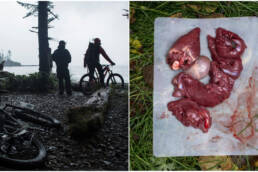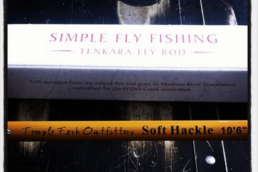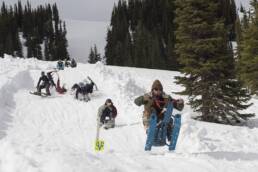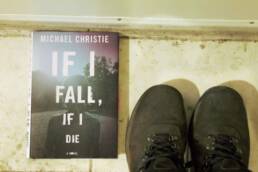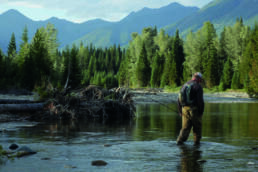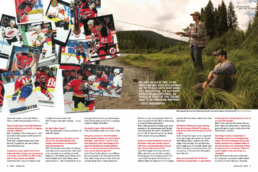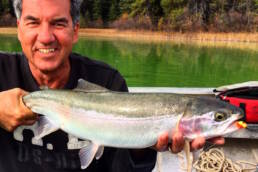Determined to dine only on what the sea and forest provide, four cyclists push into the Haida Gwaii bush, foodless. The trio resists fresh baking and KD to hunt, bonk, and bow down to humankind’s original menu, as it was meant to be. Story and photographs by Nicolas Teichrob.
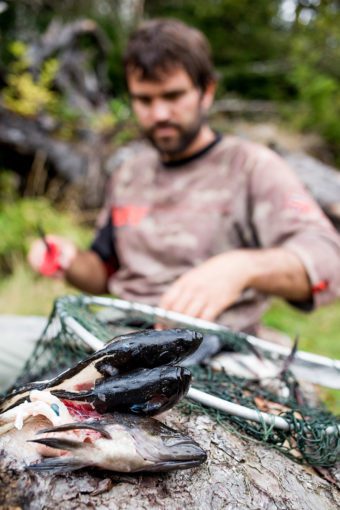 Silver salmon cruise the ghostly waters of the Tlell estuary on Haida Gwaii, British Columbia, following an innate pull homeward. There is silence, until a dark figure breaches the surface and slaps down on the glass, shattering the pre-dawn fog. The coho are out there, this we know. Consistent but sparse in numbers, these fish have been enticing us for a day and a half yet show no interest in our lures. But when it comes to nature and hunger, patience is the only way forward. We wet our lines in the morning fog. The dance is on. My friend Matt Hunter feels a tug on his line. Moments later, excitement plummets as the beast breaks free. It’s crushing. We finally had a fish, and now we have nothing. Lethargic, I almost retreat to the berries and sea asparagus, but then the raven, trickster of Haida lore, flies toward us and calls out over the river. I continue fishing with calm focus. Two casts later, the largest coho I’ve ever seen is on the hook. I will not let it go. After a long play, I land the beauty fish on shore. We’re overflowing with gratitude and joy. The fish will provide.
Silver salmon cruise the ghostly waters of the Tlell estuary on Haida Gwaii, British Columbia, following an innate pull homeward. There is silence, until a dark figure breaches the surface and slaps down on the glass, shattering the pre-dawn fog. The coho are out there, this we know. Consistent but sparse in numbers, these fish have been enticing us for a day and a half yet show no interest in our lures. But when it comes to nature and hunger, patience is the only way forward. We wet our lines in the morning fog. The dance is on. My friend Matt Hunter feels a tug on his line. Moments later, excitement plummets as the beast breaks free. It’s crushing. We finally had a fish, and now we have nothing. Lethargic, I almost retreat to the berries and sea asparagus, but then the raven, trickster of Haida lore, flies toward us and calls out over the river. I continue fishing with calm focus. Two casts later, the largest coho I’ve ever seen is on the hook. I will not let it go. After a long play, I land the beauty fish on shore. We’re overflowing with gratitude and joy. The fish will provide.
What does it take to eat well in this world? To eat real healthy food that’s not pumped with hormones, wrapped in plastic, and shipped around the globe? Is the answer to be vegan? Vegetarian? Omnivore? None of these labels provide the necessary nuanced answers. Studies have shown that eating vegetarian is effective for the planet; our collective consumption of meats must decrease if we are to feed the human population without the complete destruction of our environment. Ultimately, the sustainability of food choice comes down to energy input. Does it make sense to eat quinoa shipped from Bolivia to BC? Aside from the massive transport distance, our new love of this superfood is devastating supplies for Bolivians, who rely on the formerly cheap staple. Our consumption habits carry consequences for people, animals, and the environment. It is imperative that one considers these consequences and adjusts accordingly. But surviving on a hyper-local diet while moving through the world is more difficult than one might expect. As always, the answers are not easy.
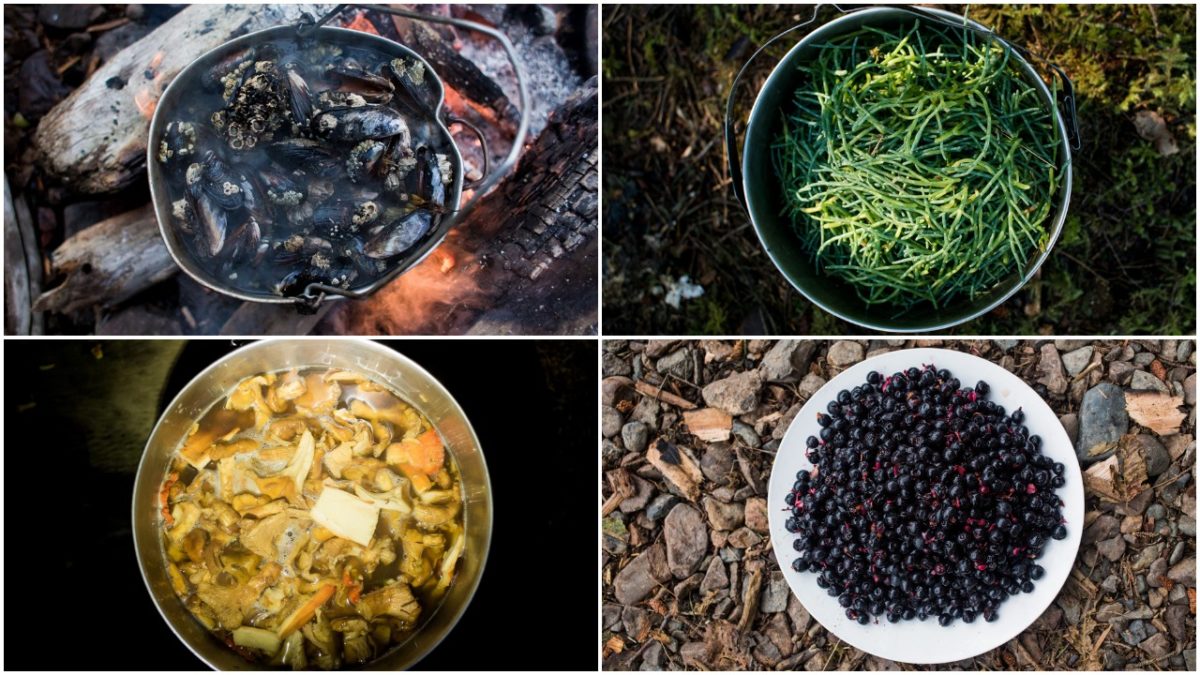
In the autumn of 2016, Hunter, Charlie McClennan, Darcy Wittenburg, and I embarked on an eight-day bicycle trip through Haida Gwaii’s islands with a self-imposed challenge. In order to force our senses to hone in on our surrounding environment, we would eat only off the land for the entire voyage: 100 per cent hunting, foraging, and fishing; 100 per cent human powered.
The energy in Haida Gwaii is dynamic and calm, slow and quick. These dualities play out in the islands in this archipelago with full force. Located 50 kilometres (31 miles) offshore from mainland British Columbia, Haida Gwaii has a history as ancient as any in North America; this was the first place to become ice-free after the most recent glaciation and likely the first place to be populated. Some 15,000 years later and the Haida Nation continues to showcase strength, warmth, and knowledge with respect to the lands and waters it governs.
When we harvest, gather, hunt, or fish for our food—practices that were mandatory for survival not long ago—our physical and metaphysical contact with the living plants and animals requires more than mere knowledge and capture. Rather, it incorporates millennia of natural selection, experience, and refinement.
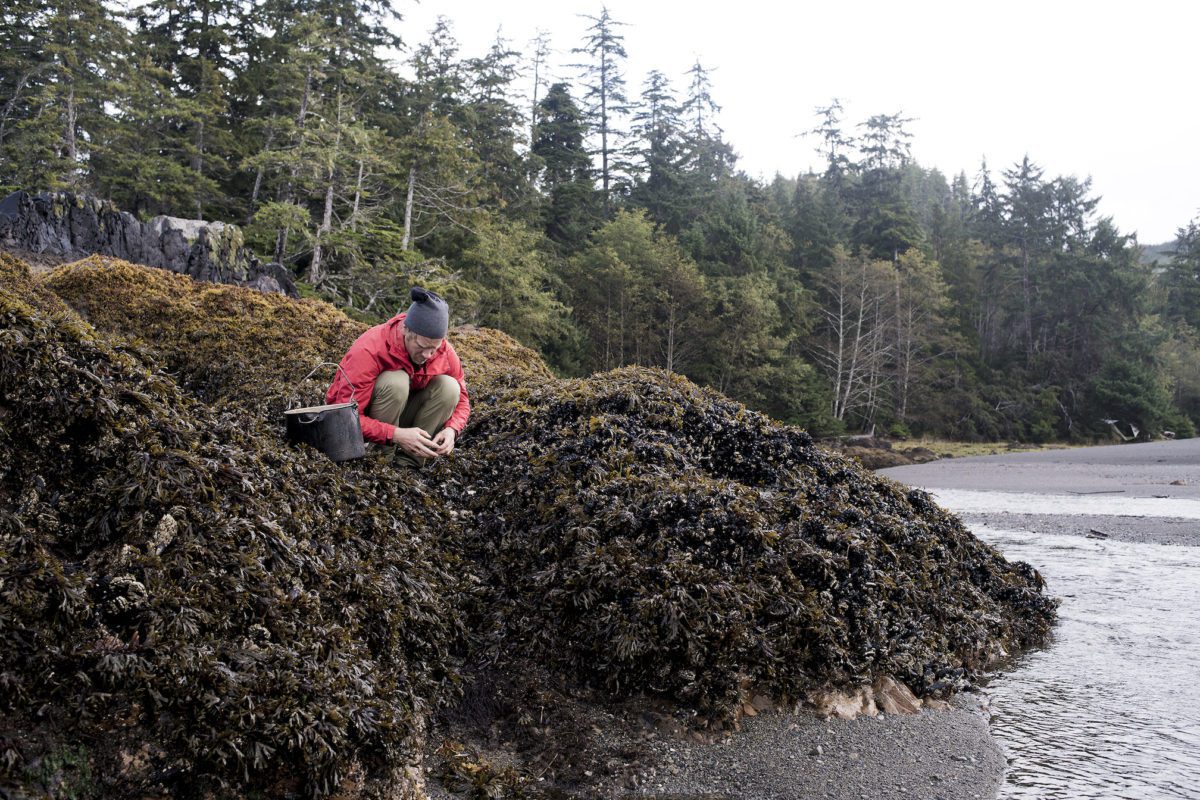
Connecting tangibly to the land and its bounty is necessary for our success. Huckleberries, blueberries, and salal berries often provide an efficient quick hit of sugar, but one cannot thrive on berries alone. Like the Haida and most of humanity before us, we seek protein-rich food. On Haida Gwaii, this means the plentiful deer that occupy every forest.
Ungulate shadows roll through the trees and pull us under the canopy. In the hunt, we learn to let go of trying and just focus with patient intention. Whatever food is available and reasonable to catch or harvest is what we will pursue. Humans need to maintain a balance of nutrients and minerals, and if eating vegetables, fungi, kelp, or meat from the earth is the nourishment we are given, then we will take it—even if it means killing. There is nothing wicked about harvesting animals in a sustainable way, especially when one is cold and tired and each animal is viewed as a respected gift. But still, killing isn’t easy. It takes energy. And energy takes food. We are quickly learning what even children knew only a few generations ago: life without a supermarket is hard.
McClennan is focused, calm, and ready. His shot is a hit, but the deer fights hard and leaps into the dense, boggy bush to escape. Looking for a dead deer in a bog while dealing with sheer exhaustion is a challenge.
When we need nourishment most, pedalling hard kilometres on low energy levels, we are greeted with a variety of foods. The lands aren’t changing, but our attitudes are. We put our trust in nature, and it guides us to rich locations and beautiful evening skies. On the west coast, we dine on mussels, gooseneck barnacles, chanterelles, salal, and rock cod. We plan for salmon, but effort equals energy and when the tide is out, the table is set. The intertidal zone provides easy-to-harvest foods, and we enjoy every bite.
The confidence that comes from the plentiful mussels, clams, and oysters on any BC beach is alluring, but it can be dangerous. Paralytic shellfish poisoning (PSP) can kill you. We test for PSP and then feast on a mountain of safe shellfish. The following day, after a rich breakfast of mussels, hunger presents its first wicked temptation. During an exploration of some spur roads, an abandoned logging trailer reveals cupboards full of Kraft Dinner, rice, canned soup, and beans. We’re hungry, and the sight of any food is tempting. Scavenging an easy score after three days of foraging and few reserves provides a powerful pull. But by the next morning we agree to leave the manufactured food behind, although we do add a tool to the quiver: an abandoned grate from the trailer’s oven.
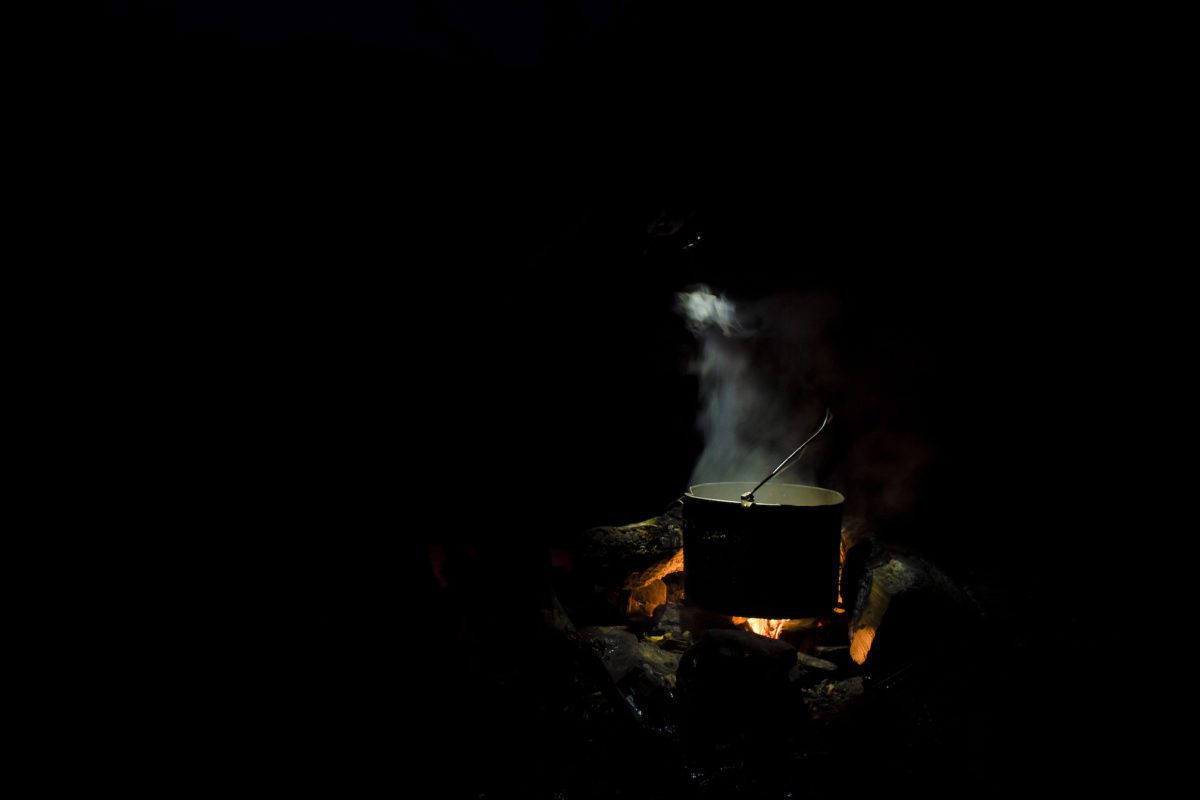
What happens to the mind when humans go hungry? We cycle listlessly, not aimless but meandering in a midday daze. The complete lack of mental energy is a strange and foreign feeling. Every human should go for a few days on an empty stomach to understand how lucky it is to be nourished on a daily basis.
Bellies full of seafood and still bonking, with lucid dreams of salmon in the rivers, we are pulled into the heart of the island. It is here, along a roadside, that the young deer presents itself. After a deflected first shot, Hunter’s second attempt is perfect. His arrow pierces the lungs. In the span of a few minutes, we go from wondering where dinner will come from to feasting on fresh ribs. Spirits are high, so we carry forward with a sack of meat and organs.
What does it take to eat well in this world? To eat real healthy food that’s not pumped with hormones, wrapped in plastic, and shipped around the globe? Is the answer to be vegan? Vegetarian? Omnivore? None of these labels provide the necessary nuanced answers.
The familiar sound of splashing in the Tlell River determines our next camp spot. Frothing to get my line wet, I prepare my fishing rod. Within five minutes, a fresh pink salmon complements our deer. We feel like royalty. For two nights, we hang out in massive old-growth trees birthed and fed on the backs of dead salmon. We smoke fish while enjoying the rich flavours of the land and waters. Our internal rhythms adjust to those of our environment. In this place of paradise, we are void of stress or worries. But our goal wasn’t to post up and live the easy life.
The temptation to deviate from the path will always be around the next corner. The key is to understand these enticements will arrive and keep the psyche focused on the task at hand. In the morning mist we move quickly, pedalling through the town of Port Clements trying to avoid the incredible scents of coffee and freshly baked goods. We follow rumours of coho east. And that’s when another deer crosses our path.
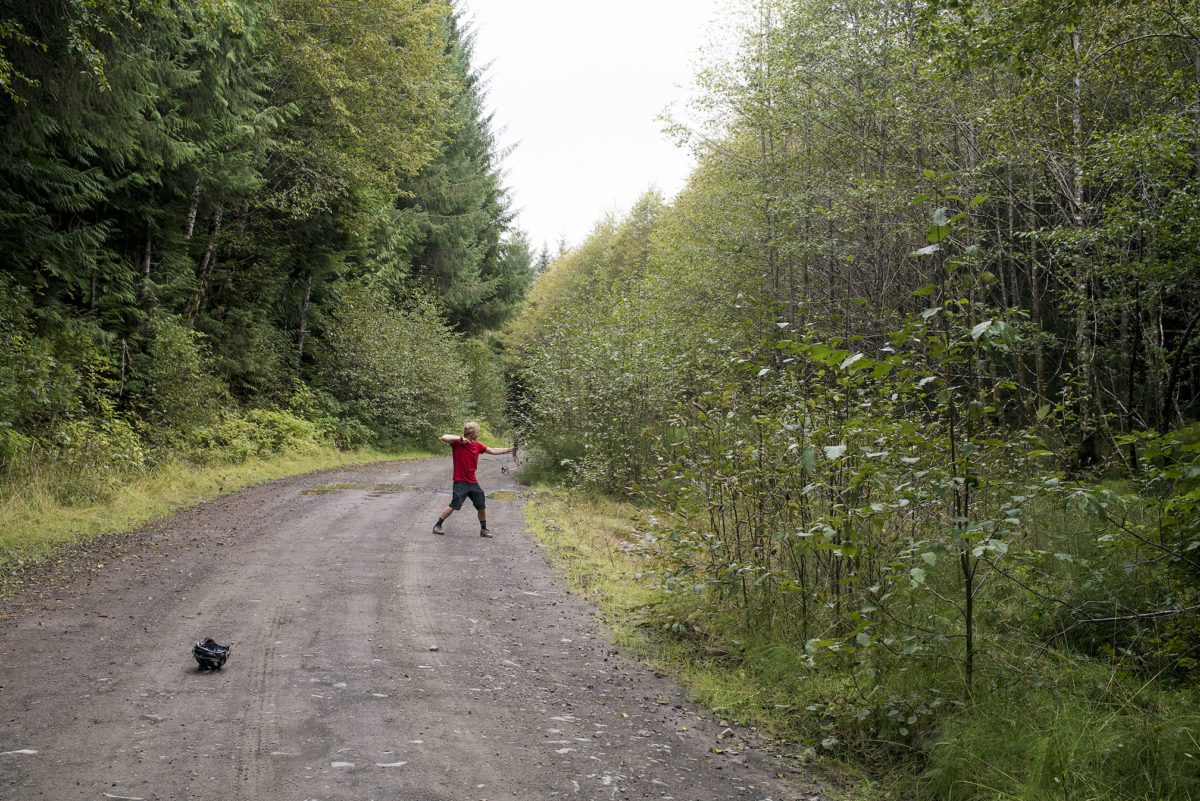
McClennan is focused, calm, and ready. His shot is a hit, but the deer fights hard and leaps into the dense, boggy bush to escape. Looking for a dead deer in a bog while dealing with sheer exhaustion is a challenge. I find myself sitting on the spongy ground with little shiny rubies all around: bog cranberries. After a quick sugar hit, Hunter makes good on his name and insists we keep to our task. We start from scratch with a keener eye and quickly find the deer. Putting in the work is necessary. Giving up is never an option. As McClennan butchers dinner, the rest of us gather a small mountain of cranberries. Again we are all filled with warmth and excitement for that evening’s feast.
As we roll along the ebbing Tlell estuary, we hear the rare fish jump. The rumours are true but the fish are elusive. We have a few days of our journey left, but we only have food on hand for one day, maybe two. A fish here would allow us to finish our trip in good health.
There is nothing wicked about harvesting animals in a sustainable way, especially when one is cold and tired and each animal is viewed as a respected gift. But still, killing isn’t easy. It takes energy. And energy takes food.
In the dawn hours, McClennan and Hunter wade out to dance with the coho. I join shortly after. This is when the raven calls and the coho arrive. We have enough food to pedal south and complete our journey strong. Our gratefulness and newfound connection to the land power us back to Queen Charlotte City.
Through work and sacrifice, humans buy healthy food at the grocery store, restaurants, and farmers’ markets, and it makes sense. To do it oneself takes energy, time, and resources. For this small group of hungry travellers, foraging and hunting on Haida Gwaii furnished a satisfaction that cannot be understated. To gather food is the most human of tasks, and many have become disconnected from this process—from understanding to caring about the sources of our energy. The fish. The deer. The fungus and mussels and berries and sea asparagus. We are what we eat, and we must love who we are.
Nicolas Teichrob mostly spends his time hunting berries, waves, and couloirs between Ucluelet and the Coast Mountains.
Related Stories
GT Or Die
Twist your throttle. Mod your ride. Best cowboy-up or step aside. Golden's rowdiest snow showdown turns ten. Writer…
Book Review: If I Fall, If I Die
Writers and skateboarders share common ground: new terrain must be read and felt. For Galiano Island, British…
Fly-Fishing in the East Kootenays
After a couple of bad breaks, an upstart East Kootenay angler learns the river's ropes and finds revival in the…
Because it’s Playoff Season
Two of the Kootenays most famous athletes might not be in the Stanley Cup Playoffs this year, but they've certainly…
Don Freschi – The King Of Columbia River Fishing
TV personality and angler Don Freschi was born and raised in Trail, British Columbia, and has fished waterways around…


